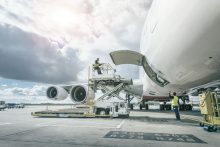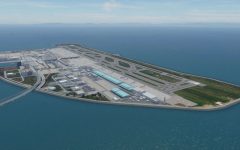 Global air cargo markets are already feeling the effects from the Russia-Ukraine conflict, according to IATA, however, the in-depth impact of the same is still to be assessed. Making the assessment based on its latest cargo demand data, IATA reveals that January has been a soft patch for the industry with a global growth of 2.7%, the lowest rise in cargo tonne kilometres (CTKs) since December 2020.
Global air cargo markets are already feeling the effects from the Russia-Ukraine conflict, according to IATA, however, the in-depth impact of the same is still to be assessed. Making the assessment based on its latest cargo demand data, IATA reveals that January has been a soft patch for the industry with a global growth of 2.7%, the lowest rise in cargo tonne kilometres (CTKs) since December 2020.
Citing the factors responsible for the impact, IATA says that the Omicron variant of Covid-19 on passenger and cargo-only networks in January, notably reduced bellyhold cargo capacity as services were cancelled, plus weaker economic drivers have led to the soft patch of the industry. The airline association further suggested, that due to the pre-Ukraine conflict, the air cargo market was likely shifting “towards a more normal growth rate of 4.9% expected for this year”, following much higher increases throughout 2021.
War in eastern Europe has introduced several uncertainties into that market and was already having a negative impact from late February, the airline body states.
Consequences seen so far will ”further reduce available capacity and increase already elevated air cargo rates”, IATA says, adding that it is too soon to predict the extent of those developments.
However, the increasing cost of crude oil, is likely to be “unprofitable for airlines and air cargo more expensive for businesses”. Although Russia accounts for only 0.6% of global air freight carried, the airspace restrictions will significantly reduce the cargo services to and from Russia, IATA notes.
Nevertheless, “several key operators” in the sector are based in Russia and Ukraine, it states.
The airspace restricton is also hampering with the Europe and Asia trade, although alternative routings may be possible, IATA continues. “The Europe-Asia market weighed 20.6% of all international CTKs in the past 12 months,” it says. “Part of the traffic flying over Russia is likely to be made up on other routes, notably via the Middle East.”
In broad terms, IATA director general Willie Walsh highlights “sanction-related shifts in manufacturing and economic activity” and “geopolitical uncertainty” as being of concern, while acknowledging that it is too soon to assess how significant those developments might be.
The sweet spot and a financial lifeline for several air lines during the pandemic, air cargo demand has consistently been measuring above pre-crisis levels across 2021, in stark contrast to the performance of most passenger markets.
Breaking News
- Maharashtra to build India’s first offshore Airport in 2026
- ‘India’s scale, policy support & investment benefitting the sector’
- DPIIT selects Thiruvananthapuram & Kochi to improve logistics ops
- KSH Infra plans to invest ₹550 crore in logistics park in Tamil Nadu
- GHIAL acquires 70% stake in ESR Logistics park to develop airport land
- ACFI, TIACA sign MoU to foster innovation in air cargo landscape
- Meghalaya ferries heavy Pineapple shipment to Dubai
- ‘Tech crucial to manage capacity during peak season’
- ‘ With converted freighters and increased bellylift, airlines are meeting growing domestic demand’
- ‘Bonded-warehouse stockpiling is being used to buffer against EXIM disruptions’
- ‘This shift is part of broader transformation to stay adaptable & relevant’
 Cargo Breaking News
Cargo Breaking News


